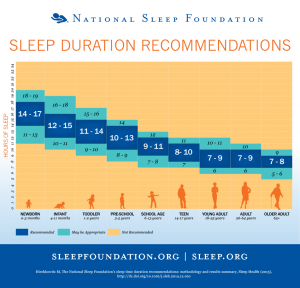The school year is well under way, and many parents can become concerned about their child’s performance in school. Some children may benefit significantly from small changes to their lifestyle and diet. The following tips may help your child to perform optimally in school:
- Sleep – this tip may seem very straight forward, but many children do not get enough sleep. Sleep is so important for children because this is when we process information, grow, and re-energize for the day ahead. If a child does not get enough sleep, they may become quite agitated in the classroom and potentially cause disruption. They may also be unable to concentrate because of the fatigue. Provided to the right is a chart that gives you an idea of how much sleep your child needs according to their age group, as recommended by the sleep foundation (Source: http://sleepfoundation.org/how-sleep-works/how-much-sleep-do-we-really-need) . To further drive home the point, research has been done in regards to sleep and school performance. The research has shown that shortened sleep, disrupted sleep schedules, late bed and rise times, and poor sleep quality all negatively impact academic performance.
- Exercise – Exercise is very important for your child. Exercise provides a way to boost mood, boost energy, re-focus, and give a sense of accomplishment depending on the form. By encouraging regular exercise, it allows your child to get the energy release they need and gives them an opportunity to “collect” themselves before re-focusing on school tasks. Research has shown that exercise and physical activity in school aged children can actually increase Grade Point Averages (GPA).
- Fruits and Vegetables – no discussion would be complete without discussing the benefits of fruits and vegetables. Fruits and vegetables can provide significant amounts of B vitamins, which are beneficial for brain functioning, mood, energy, stress, and concentration.
- Reduce Screen Time – screen time (i.e. televisions, cell phones, I pads, computers, etc.) could have a negative impact on your child’s future educational achievement. Some research has suggested that the more a child spends in front of a television, the less that they will achieve in the future in regards to degrees and educational achievement. I want to point out that some individuals do benefit from the use of different software to help engage with learning, and so, this recommendation needs to be adapted to your child’s specific needs.
- Parenting Style – interestingly enough, the way a child is parented can impact their achievement in school. Research has identified five “processes” that contribute to school achievement. They are: “verbal interactions between mother and children, expectation of parents for achievement, positive affective relationships between parents and children, parental beliefs and attributions about the child, and discipline and control strategies.” Of these processes, discipline and control strategies were the most strongly associated with school achievement.
If your child still experiences difficulty with concentration and focus in school, it is important for you to seek the help of a naturopathic doctor, pediatrician, or other health care provider. Some of the causes can be as simple as a nutritional deficiency, and some may require further evaluation.
Have you benefitted from reading this blog? Know someone that would benefit as well? Share, Like, Comment, or Tweet this article, and let me know what you think.
Some of the information provided above may not be appropriate for everyone, please consult with your doctor before trying any of the above. If you are interested in Naturopathic Medicine and wanting a different approach to your health care needs, contact Elisha Cook via the contact portion of this website.
Source: http://sleepfoundation.org/sites/default/files/STREPchanges_1.png
http://www.smrv-journal.com/article/S1087-0792(03)90003-7/abstract



